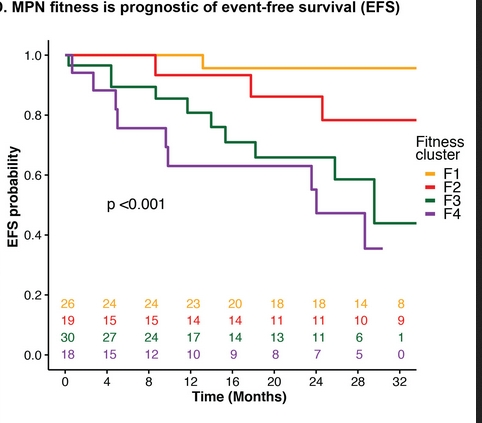A study from I think the Cornell MPN group has a new risk measuring method they found to be a good indication of prognostics for event free survival and treatment response.
Top conclusion is this new measurement method of the mutant cells is much more relevant than allele burden (VAF).
--
They developed an unspecified way to rate "MPN fitness - the competitive advantage of mutated hematopoietic stem and progenitor cells (HSPC) over their normal counterparts.."
I understand this to mean a scale (they use F1-F4) measuring how durable the v617f mutated cells are.
"Patients with increased fitness (the bad thing) were more likely to experience an adverse event (33% vs 0%, p=0.047) and were less likely to achieve clinical response (13% versus 75%, p=0.007) than pts with decreased fitness.
Change in WB (whole blood) MAF (VAF) did not correlate with change in fitness (r 2=0.0116) and did not predict events (p=1) nor clinical response"
sciencedirect.com/science/a...
--
So fitness of the mutated cells matters more than how many of them there are. The plot here shows the effect of fitness clearly, very large differences.
Maybe this can measure the frustrating variations we see among many of us and inform how well we will respond to treatment as they say.
They plan to do a trial to make this fitness test available clinically. Seems it would not require BMB.
One take is we might have some idea of our F level since events are concentrated in just a couple years: if we make it for two years without an event, odds are higher we are lower on the scale (this is my thought, not theirs)
